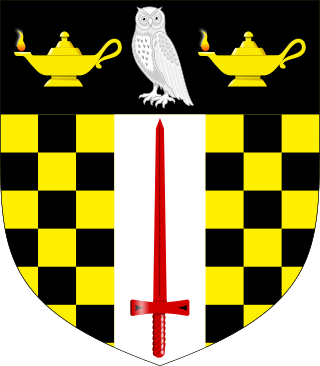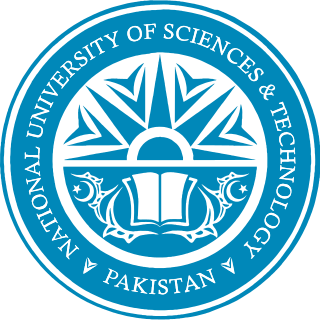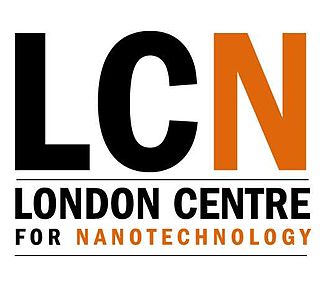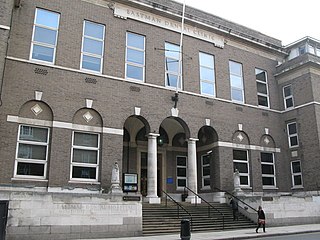
Sir William Ramsay was a Scottish chemist who discovered the noble gases and received the Nobel Prize in Chemistry in 1904 "in recognition of his services in the discovery of the inert gaseous elements in air" along with his collaborator, John William Strutt, 3rd Baron Rayleigh, who received the Nobel Prize in Physics that same year for their discovery of argon. After the two men identified argon, Ramsay investigated other atmospheric gases. His work in isolating argon, helium, neon, krypton, and xenon led to the development of a new section of the periodic table.
University College London, which operates as UCL, is a public research university in London, United Kingdom. It is a member institution of the federal University of London, and is the second-largest university in the United Kingdom by total enrolment and the largest by postgraduate enrolment.

The University of Manchester is a public research university in Manchester, England. The main campus is south of Manchester City Centre on Oxford Road. The university owns and operates major cultural assets such as the Manchester Museum, The Whitworth art gallery, the John Rylands Library, the Tabley House Collection and the Jodrell Bank Observatory – a UNESCO World Heritage Site.

Middlesex University London is a public research university in Hendon, northwest London, England. The name of the university is taken from its location within the historic county boundaries of Middlesex.

The Norwegian University of Science and Technology is a public university in Norway and the largest university by enrollment in the country. The university's headquarters campus is located in Trondheim, with regional campuses in Gjøvik and Ålesund.

Birkbeck, University of London, is a public research university, located in Bloomsbury, London, England, and a member institution of the federal University of London. Established in 1823 as the London Mechanics' Institute by its founder, Sir George Birkbeck, and its supporters, Jeremy Bentham, J. C. Hobhouse and Henry Brougham, Birkbeck is one of the few universities to specialise in evening higher education in the United Kingdom.

The National University of Sciences & Technology (NUST) is a multi-campus public research university having its main campus in Islamabad, Pakistan.

The Bartlett Faculty of the Built Environment is the academic centre for the study of the built environment at University College London (UCL), part of the University of London in London, United Kingdom. It is home to thirteen departments that have expertise in individual fields of the built environment, including the Bartlett School of Architecture, Bartlett School of Planning, Bartlett Development Planning Unit, and Centre for Advanced Spatial Analysis. The Bartlett is consistently ranked the highest in Europe and the UK and among the highest in the world for the "Architecture and the Built Environment" category in major rankings. In the 2021 QS World University Rankings, it was ranked second in the world, and was ranked third in the 2022 Rankings.

University of Technology Malaysia (UTM) is a premier Malaysian public research-intensive university ranked 203rd in the world by QS University rankings. Its medium of instruction is English.

University of Erlangen–Nuremberg is a public research university in the cities of Erlangen and Nuremberg in Bavaria, Germany. The name Friedrich–Alexander comes from the university's first founder Friedrich, Margrave of Brandenburg-Bayreuth, and its benefactor Alexander, Margrave of Brandenburg-Ansbach.

The London Centre for Nanotechnology is a multidisciplinary research centre in physical and biomedical nanotechnology in London, United Kingdom. It brings together three institutions that are world leaders in nanotechnology, University College London, Imperial College London and King's College London. It was conceived from the outset with a management structure allowing for a clear focus on exploitation and commercialisation. Although based at UCL's campus in Bloomsbury, the LCN includes research in departments of Imperial's South Kensington campus and in King's Strand campus.
Bioprocess engineering, also biochemical engineering, is a specialization of chemical engineering or biological engineering. It deals with the design and development of equipment and processes for the manufacturing of products such as agriculture, food, feed, pharmaceuticals, nutraceuticals, chemicals, and polymers and paper from biological materials & treatment of waste water. Bioprocess engineering is a conglomerate of mathematics, biology and industrial design, and consists of various spectrums like the design and study of bioreactors to the creation of kinetic models. It also deals with studying various biotechnological processes used in industries for large scale production of biological product for optimization of yield in the end product and the quality of end product. Bioprocess engineering may include the work of mechanical, electrical, and industrial engineers to apply principles of their disciplines to processes based on using living cells or sub component of such cells.
The Faculty of Science and Engineering (FSE) is one of the three faculties that comprise the University of Manchester in northern England. Established in October 2004, the faculty was originally called the Faculty of Engineering and Physical Sciences. It was renamed in 2016, following the abolition of the Faculty of Life Science and the incorporation of some aspects of life sciences into the departments of Chemistry and Earth and Environmental Sciences. It is organised into 2 schools and 9 departments: Chemical Engineering and Analytical Science; Chemistry; Computer Science; Earth and Environmental Sciences; Physics and Astronomy; Electrical & Electronic Engineering; Materials; Mathematics; and Mechanical, Aerospace and Civil Engineering.
The Faculty of Arts and Humanities is one of the 11 constituent faculties of University College London (UCL). The current Executive Dean is Professor Stella Bruzzi, FBA. Ranked 5th in the Times Higher Education World University Rankings (2022), the Faculty of Arts & Humanities at UCL is recognised globally for both its teaching and research excellence.
The UCL Faculty of Social and Historical Sciences is one of the 11 constituent faculties of University College London (UCL). The current Executive Dean of the Faculty is Professor Jennifer Hudson, having been appointed from September 2022.
The UCL Faculty of Mathematical and Physical Sciences is one of the 11 constituent faculties of University College London (UCL). The Faculty, the UCL Faculty of Engineering Sciences and the UCL Faculty of the Built Envirornment together form the UCL School of the Built Environment, Engineering and Mathematical and Physical Sciences.

The UCL Eastman Dental Institute is the dental school of University College London (UCL) and an academic department of UCL's Faculty of Medical Sciences. The institute is based on Gray's Inn Road in the Bloomsbury district of London, United Kingdom, adjacent to the Eastman Dental Hospital, with which it is closely associated.
Peter Dunnill, OBE, FREng, was a British pioneer in biochemical engineering and professor at the University College London (UCL), University of London.

Nigel Shaun Scrutton is a British biochemist and biotechnology innovator known for his work on enzyme catalysis, biophysics and synthetic biology. He is Director of the UK Future Biomanufacturing Research Hub, Director of the Fine and Speciality Chemicals Synthetic Biology Research Centre (SYNBIOCHEM), and Co-founder, Director and Chief Scientific Officer of the 'fuels-from-biology' company C3 Biotechnologies Ltd. He is Professor of Enzymology and Biophysical Chemistry in the Department of Chemistry at the University of Manchester. He is former Director of the Manchester Institute of Biotechnology (MIB).
Maxwell Bruce Donald FRIC FIChemE FRHistS was a Ramsay professor of chemical engineering at University College London and a historian specialising in mining.














